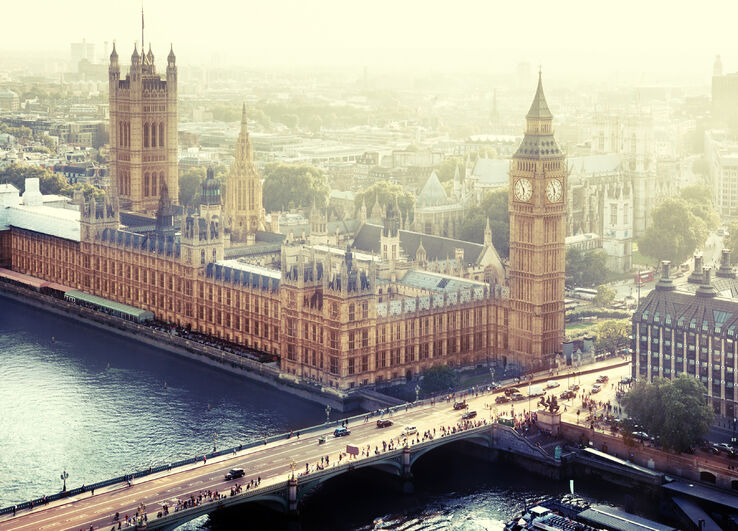Now the “Illegal Migration” Act has become law, what next?
The so-called “Illegal Migration” Act has now become law. We fought hard against this proposed law, which we knew would be so damaging to survivors and victims – not just in the UK but around the world. Our Parliamentary Officer Lucy Symington reflects on what this law means in practice, and what we should do next.
How did we get here?
It doesn’t feel long ago that the UK was being praised for introducing the “world leading” Modern Slavery Act. But in the meantime we’ve seen years of hostile policies break apart support for survivors, leaving many trapped in exploitation and at risk of further harm. So, how did the UK Government move so quickly between the proactive Modern Slavery Act 2015 and the deeply damaging Nationality and Borders Act 2022, the Rwanda Policy and the “Illegal Migration” Act 2023?
In order to understand the path taken in the UK and what we can expect to see next, we need to take a hard look at the Modern Slavery Act 2015, and recognise some of the tensions that were baked into it. Many of these tensions laid the foundation for the challenges we are now seeing:
- Modern slavery support was designed to fit alongside the asylum system – even though many victims are British nationals or already have settled status. The fractured approach has made its support very vulnerable to hostile environment policies.
- Like the asylum system, modern slavery support rests outside of support provision for the general population – so victims of modern slavery have to go via the Home Office to access housing, health care and financial support. This set-up has made the support more fragile to policy changes.
- The hostile environment approach in general pushes a culture of disbelief – this has been dangerously applied to the modern slavery system. Additionally, the UK Government has pursued an immigration policy of “deterrence” – but in doing so, victims of slavery are being left more vulnerable to the risks of trafficking.
- Combining the above, the system was designed for people to report the crime of modern slavery and access support very differently to other public services. This has made the damaging impact of changes to who can access modern slavery support even more widespread, deterring people from speaking up.
The UK is at a crossroads, and it is vital we take the path to put survivors back at the heart of modern slavery policy and align with our international commitments to tackle trafficking in human beings. We’ve outlined some stark warnings.
We need to believe survivors of modern slavery
Like with the UK asylum system, successive UK governments and the media have promoted a culture of disbelief around modern slavery. In March 2021 Priti Patel’s Home Office issued a press release on the “alarming rise of abuse in the system.” In the years since this press release, accusations of “abuse” have featured in many official Home Office comments on modern slavery in the UK, despite reprimands from the UK statistics watchdog and the UN High Commissioner for Human Rights and significant evidence to the contrary.
We must reduce the evidence threshold
Just over a year later, Prime Minister Rishi Sunak announced in December 2022 the intention to “remove the gold plating in our modern slavery system.” The Home Office immediately began to put changes into motion, making it harder for victims to access support. For example, new regulations mandate that a victim must be able to provide “objective” evidence to support their referral to the modern slavery National Referral Mechanism (NRM) to determine whether there are “reasonable grounds” to believe this person has experienced modern slavery.
While this change has since been found unlawful, there has already been a catastrophic dip in positive reasonable grounds” decisions for adults referred to the National Referral Mechanism (NRM) in 2023, falling to a low of 25% – just one in four – between April and June 2023. Since the inception of the NRM, this figure has been consistently above 80%. The change compounds a culture of disbelief that ultimately leaves potential victims without support.
We look to the immediate future with grave concern. There’s no evidence to suggest that modern slavery in the UK is decreasing, so instead, these figures suggest we are simply barring more and more potential victims of slavery from accessing vital support. As well as dire implications for the human rights of those affected and our international human rights obligations, this will likely also leave victims in exploitation afraid to come forward, increase incidents of trafficking, and allow perpetrators to go unchallenged.
No amount of deterrence will prevent modern slavery
The “Illegal Migration” Act 2023 marks the Government’s latest – and most severe – application of deterrence to both the asylum and modern slavery support systems in the UK. It follows on from the Nationality and Borders Act 2022, which tightened access to modern slavery support by prioritising immigration enforcement. Its effects were only starting to be seen as it was then superseded by the even stricter proposals in the “Illegal Migration” Act.
Implemented as part of a targeted and divisive campaign promising to stop people risking – often dangerous – passage into the UK, the new law bars any people who arrive in the UK via an irregular route, be that by land air or sea, from accessing either asylum or modern slavery support. The Act does not distinguish between those brought to the UK under force or coercion as part of their trafficking journey and pays no regard to the absence of any safe routes to apply for asylum from outside the UK.
The Act seeks to use threats of detention, deportation and denied access to support to deter people from arriving in the UK. This will not only affect those who have already suffered exploitation, harming recovery and risking retrafficking, but will exacerbate conditions of vulnerability that will drive more people into slavery.
Countless experts have disagreed with using deterrence in public policy, including in an internal Home Office report published following a freedom of information request. And yet, since the Act passed into Law, the Minister for Immigration Robert Jenrick has suggested that in addition to curbing access, the Government may not be incentivised to improve support systems – as a perceived lack of support might “deter” people. The Labour Party have also featured deterrence in their proposals to reform the asylum system, arguing their policy on returns agreements will have a deterrent effect.
Where can we go from here?
It may be a long road back to overturn the forces that have eaten away at modern slavery support in the UK. Disbelief and deterrence have not only been baked into our modern slavery support system but have contributed to breaking it down from the inside out.
It’s time to put compassion, support and recovery at the heart of our approach to modern slavery. We need to stand in solidarity with those who will now be excluded from support, possibly left in exploitation or facing detention and removal should they speak up. We need to defend our international commitments, that give us the blueprint for ending human trafficking. We need every person to use their voice to join us in calling for a safe system that puts survivors first.
We will continue to fight by challenging hostile language used by elected officials and the media, supporting legal challenges to damaging policies that break international law, inviting survivors to take a leading role in advocacy, and by targeting key change makers to make them understand the urgency and priority of this issue.


